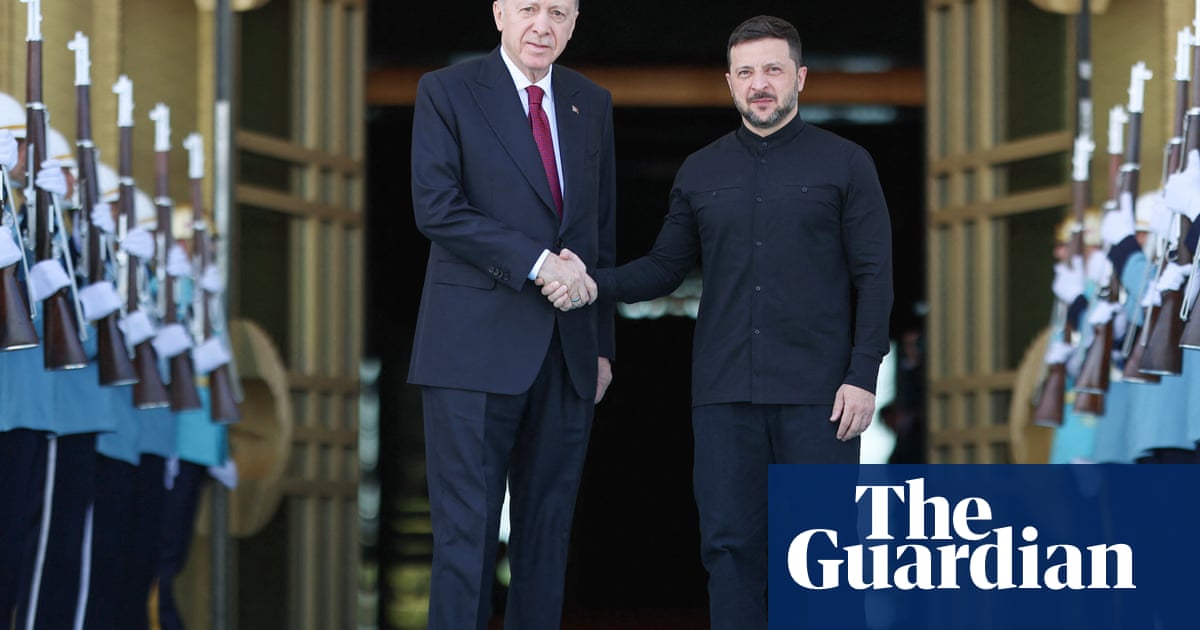Ukraine and Russia are due to hold their first direct peace talks in more than three years in Istanbul on Thursday and Friday, though the exact timing and format remain unclear.
Moscow has notably withheld its top diplomatic heavyweights – including Vladimir Putin’s chief foreign policy aide, Yuri Ushakov, and his foreign minister, Sergei Lavrov – instead dispatching a peculiar mix of officials, among them an ultranationalist former culture minister and a notorious spymaster.
Ukraine’s delegation, which is comprised of President Volodymyr Zelenskyy’s most trusted aides, arrived in Ankara on Thursday and is expected to travel to Istanbul. Zelenskyy is not expected to attend, and neither is Putin.
Leading Russia’s delegation is Vladimir Medinsky,a Russian ultra-conservative former culture minister and who is an aide to Putin.
A staunch nationalist, he is known for promoting a heavily revised, state-centric version of Russian history and values. His Myths About Russia book series attempts to debunk perceived anti-Russian narratives but has been widely criticised for historical distortion.
Medinsky once prompted ridicule by claiming that Russians “have an extra chromosome”, a bizarre and pseudoscientific statement meant to suggest innate Russian resilience and uniqueness.
He led the Russian delegation at the spring 2022 Istanbul peace talks with Ukraine and now plays a key role in shaping Kremlin messaging on the war. He has also overseen new history textbooks portraying Ukraine as an ultranationalist state and casting the invasion as a justified response to western aggression.
Another notable member of Russia’s delegation inTurkeyis Igor Kostyukov, the head of the GRU, Russia’s military intelligence agency, which has been behind some of Moscow’s most notorious covert operations in recent years.
Kostyukov is under sanction in the US for his alleged role in interfering in the 2016 presidential election, and the UK over the 2018poisoning of the former Russian spy Sergei Skripal in Salisbury,whichkilled Dawn Sturgess.
Most recently, the GRU has been accused of orchestrating a series of sabotage operations acrossEurope, including arson attacks, cyber-intrusions, data theft, and attempts to target undersea cables.
Col Gen Alexander Vasilyevich Fomin is a seasoned Russian military officer and diplomat. Like Medinsky, Fomin was part of the Russian delegation in the 2022 peace talks with Ukraine held in Istanbul.
Fomin isn’t a household name in Russia. A veteran of Russia’s defence establishment, he has quietly built a career as one of the Kremlin’s top military diplomats. Fomin’s name has also come up in connection with Russia’s deeper military ties to non-western allies – from arms sales to Myanmar and Egypt to increasingly warm ties with North Korea and Iran.
Mikhail Galuzin is not known as a typical Kremlin hardliner. Bookish, fluent in Japanese, and fond of quoting classical literature, he’s long been one of the more polished faces of Russian diplomacy. He cut his teeth in the Soviet embassy in Tokyo and has remained Moscow’s go-to man on all things east Asia, serving as ambassador to Indonesia and later Japan.
However, Russia’s invasion of Ukraine brought him back to Moscow. Appointed the deputy foreign minister in late 2022, Galuzin now oversees relations with Russia’s post-Soviet neighbours including Ukraine, which Moscow claims is part of its “sphere of influence”.
Rustem Umerov, Ukraine’s defence minister since September 2023, is an ethnic Crimean Tatar and a former investment banker with close ties to Turkey. A fluent Turkish speaker and practising Muslim, he has played a key role in Kyiv’s efforts to rally international support for the return of Crimea. Umerov co-chaired the Crimea Platform diplomatic summit and took part in Ukraine’s initial negotiations with Russia in 2022. His appointment was seen as a signal of reform in the defence ministry, which had been plagued by corruption
Andriy Yermak is Ukraine’s presidential chief of staff and widely regarded as the country’s second most powerful figure after the country’s president. A former entertainment lawyer and film producer, Yermak became a close confidant of Zelenskyy during his media career and joined his political team in 2019.
Since Russia’s full-scale invasion in 2022, Yermak has emerged as a central figure in Ukraine’s wartime leadership. He oversees foreign policy, intelligence coordination, and high-level diplomacy, including prisoner exchanges and peace negotiations. His influence is so extensive that he has been dubbed Ukraine’s “Green Cardinal” and “de facto vice-president”. Yermak’s prominence has drawn praise and controversy, with critics accusing him of centralising power.
A surprise inclusion in the delegation, Vasyl Malyuk is Ukraine’s spymaster-in-chief, serving as head of the Security Service of Ukraine (SBU) since February 2023. A career intelligence officer who rarely travels abroad in public, Malyuk has been vital in reshaping the SBU into a more agile and lethal force amid Russia’s full-scale invasion. Malyuk is believed to have overseen high-profile operations, such as the arrest of the pro-Russian politician Viktor Medvedchuk and the development of maritime drones used in attacks on the Russian navy.
Andriy Sybiha is Ukraine’s foreign minister, appointed in September 2024 after a long career in diplomacy and presidential strategy. A seasoned operator fluent in English and Polish, he is widely seen as a trusted Zelenskyy loyalist, having served for years as the deputy head of the president’s office, where he oversaw foreign policy and helped coordinate international partnerships during the war.
Andriy Hnatov is Ukraine’s newly appointed chief of the general staff, promoted in March 2025 as part of Zelenskyy’s military reforms. A veteran marine officer with more than two decades of service, Hnatov is known for his frontline leadership and loyalty under pressure.
In 2014, during Russia’s annexation of Crimea, Hnatov was among the few Ukrainian marines who refused to defect, leading a group of 200 troops out of the peninsula to rebuild the marine corps from scratch. He later commanded the 36th Separate Marine Brigade and played key roles in the defence of Mykolaiv and Bakhmut.
